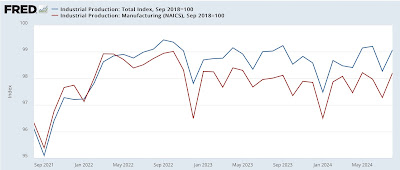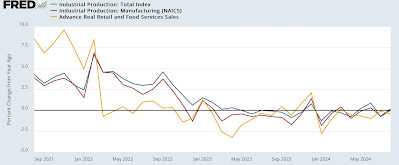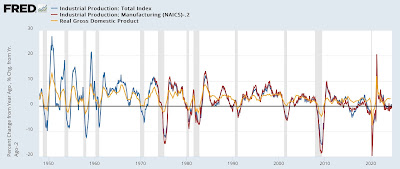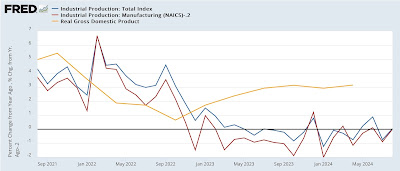And now, some good news: industrial and manufacturing production rebounded strongly in August – by New Deal democrat In the past, industrial production has been the King of Coincident Indicators, since its peaks and troughs tended to coincide almost exactly with the onset and endings of recessions. That weighting has faded somewhat since the accession of China to the world trading system in 1999 an the wholesale flight of US manufacturing to Asia, generating several false recession signals, most notably in 2015-16. But it is still an important coincident measure in the economy. As with last month, there were significant downward revisions, but the story this month was a strong rebound. Total production was reported higher by 0.8%, and
Topics:
NewDealdemocrat considers the following as important: Industrial and Manufacturing, US EConomics
This could be interesting, too:
NewDealdemocrat writes JOLTS revisions from Yesterday’s Report
Bill Haskell writes The North American Automobile Industry Waits for Trump and the Gov. to Act
Bill Haskell writes Families Struggle Paying for Child Care While Working
Joel Eissenberg writes Time for Senate Dems to stand up against Trump/Musk
And now, some good news: industrial and manufacturing production rebounded strongly in August
– by New Deal democrat
In the past, industrial production has been the King of Coincident Indicators, since its peaks and troughs tended to coincide almost exactly with the onset and endings of recessions. That weighting has faded somewhat since the accession of China to the world trading system in 1999 an the wholesale flight of US manufacturing to Asia, generating several false recession signals, most notably in 2015-16. But it is still an important coincident measure in the economy.
As with last month, there were significant downward revisions, but the story this month was a strong rebound. Total production was reported higher by 0.8%, and manufacturing production by an even stronger 1.0% (graph normed to 100 as of pre-pandemic high water mark):
On a YoY basis, total production is unchanged, while manufacturing production has risen 0.2%:
In the above graph, I also show the updated YoY real retail sales YoY data (gold), which shows that both, in accord with their short leading status, real sales have anticipated the downward trend in production followed by two years of more or less treading water.
Finally, here is the long term look at industrial and manufacturing production vs. real GDP (gold):
During the 20th century all the way up to the 1980s, when industrial and manufacturing production growth had declined to 0% YoY, the economy was entering or in a recession about twice as often as not. Thereafter right up until the pandemic while there was a marked deceleration in real GDP, a recession did not necessarily occur, most especially in 2015-16.
Here is the post-pandemic view:
With total and manufacturing production trending slightly higher in recent months (per the first graph above) compared with last year, this forecasts a steady real GDP somewhere in the neighborhood of 3% annualized this quarter.
The Bonddad Blog
Domestic factory orders and production vs. real imports as economic forecasting tools, Angry Bear by New Deal democrat




